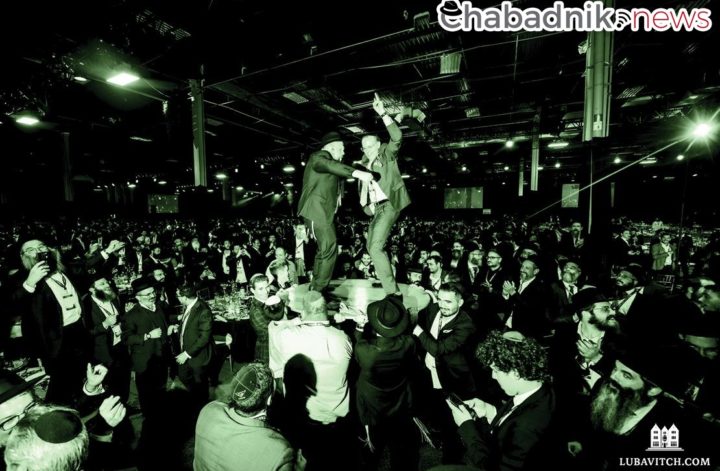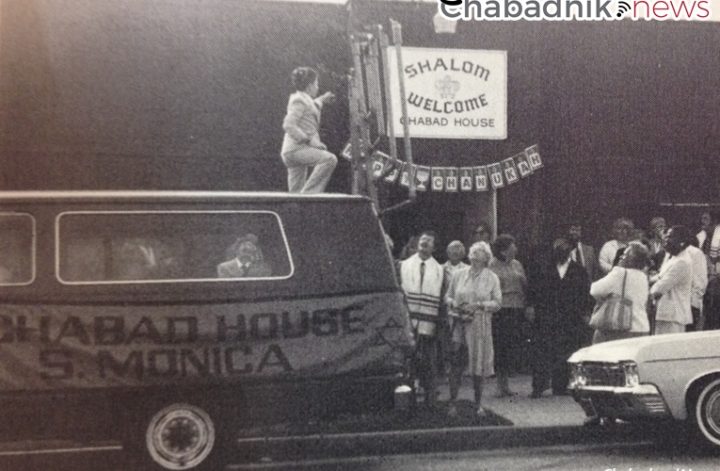From the joyful naming of a baby to the lonely burial of a parent, finding ways to carry on
Everyone knows that Jewish life-cycle events are communal affairs. Be it a circumcision, a wedding, or unfortunately, a shiva house, Jews traditionally celebrate, and mourn, together. With the global pandemic of COVID-19 foisting social-distancing rules on billions of people worldwide and keeping them at home, Jews marking various stages of the lifecycle have hit upon an unprecedented dilemma: how?
Yet, as Jews from New York City to Johannesburg to rural Maine are rediscovering, the essence of Jewish life is not a miles-long guest lists or buffet tables heaping with food, but rather affirming the Jewish people’s bond with G‑d and carrying on the tradition that began at Sinai. The following stories tell the tale of a people carrying on their tradition under some of the most trying circumstances.
An Intercontinental ‘Brit Milah’
Alexander Rosemberg, deputy regional director of the Anti-Defamation League in the New York and New Jersey region, lives with his wife, Vivian, in Jersey City, N.J. This year was particularly special for them as they were expecting their first child at the end of March. With both hailing from large families, typical gatherings are always a big bash with the average Shabbat dinner drawing 40 attendees. For the brit milah of their son, they were expecting nothing less than a party with 100 or so people from around the world.
Family members abroad had plane tickets in hand, and everyone was waiting for the anticipated moment to arrive when cries of “Mazal tov!” could be heard, and everyone would sit together for the joyous seudat mitzvah meal.
And then things started to clamp down. Work moved from the office to home, the country entered into lockdown, and Alex was hearing from other expecting friends that they weren’t even letting expectant dads into labor and delivery wards.
It was Rabbi Levi Heber, their mohel—the trained professional scheduled to perform the circumcision—who first suggested to the Rosembergs that maybe they should consider scaling things down. While it was initially thought that the party was still on, albeit on a smaller scale, by the time Vivian and their new baby left the hospital, it was clear that this brit would have to be something entirely different.
“It was immediate family only,” Rosemberg told Chabad.org. “We were all wearing gloves and masks, taking extreme measures to maintain maximum caution. While it was very small at home, I purchased a license for Zoom video conferencing, and between everyone who logged on, we were joined by probably 150 people or more.”So while the event at home was very small, the global audience was actually bigger than it would otherwise have been. Of course, the most important aspect of the celebration—a Jewish boy entering the covenant of Abraham—took place without a hitch.
“Did our new son, Rafael Jacob miss out? I don’t know,” said Rosemberg. “But we’re grateful that we were able to celebrate the simcha and still share it with so many people this way.”
Secluded South Africa Minyan Names Newborns for the World

Rabbi Jonathan Fox works for the Chevra Kadisha, the Jewish burial society, in Johannesburg, South Africa, where the organization assumes an outsized role of tending to the overall needs of not only those who have passed, but also the elderly and other populations requiring care. It is in that context that he serves as the rabbi for the residents of the Sandringham Gardens retirement home.
Never would he have imagined that their retirement home minyan would one day become a baby-naming hotspot for the global Jewish community.
As it turns out, the residents of Sandringham Gardens entered into lockdown at the very beginning of the crisis, not letting anyone in or out. The entire home has tested negative for the virus, so the administration saw no need to cancel the thrice daily minyan in the home.
As word got out that there is a COVID-safe minyan at the bottom tip of the African continent, requests started coming in to perform the duties that only a minyan can perform—for instance, naming newborn baby girls, which is done at the Torah on days it is read, Mondays, Thursdays or Shabbat.
At this point, Fox is naming a whole list of newborn babies across the globe three times a week. “We feel very privileged to provide this service,” he said. “On schedule for tomorrow, we have naming services for babies in Montreal, the United Kingdom and Israel.
With video recordings circulating on social media via WhatsApp, Facebook and Instagram, this small minyan of elderly residents in South Africa are literally a connection point between the entire Jewish world.
From the beginning of the pandemic, as synagogues began closing in various locations, Chabad.org created a Kaddish-saying service in similar, isolated locations around the globe. Thousands of individuals grieving for a mother, father, sister, brother, spouse or even for a child, have found a degree of comfort by having someone say Kaddish for their loved ones through Chabad.org because they weren’t able to. “Your volunteers are all I have left,” wrote one person after sending the name of the deceased family member.
“While many thousands have signed up, it’s important to remember that every individual, every neshama, is an entire world,” said Chani Benjaminson, who is administering the Chabad.org Kaddish service.
So while most may be stuck at home, the modern world affords ways for girls to be named and for Kaddish to be said, safely, sometimes on the other side of the world, helping people celebrate life and mourn those who have been lost.
Dancing With the Bride and Groom on Instagram
Jewish weddings are lovely affairs, with guests, spirits and a whole lot of hoisting young brides and grooms up in the air. Ilana Ybgi was waiting for that special moment, as she and her fiancé, Srulick, were planning their big day in a countryside cricket club in Shenly, England, for close family and friends. Both based in Brooklyn, N.Y., they were eagerly awaiting the moment that they would join up with family and friends and celebrate their wedding together.
As has become a familiar storyline, when the calendar turned to mid-March, Srulik phoned his fiancé and struck up the conversation about changing their plans. With U.S. travel bans in place from Europe, it was becoming clear that the wedding would probably have to be local, in New York, with family and friends having to miss the celebration.
It was March 12, just a few weeks before the planned wedding on March 30 in London. After a flurry of phone calls, particularly with Devorah Benjamin of Chevrah Simchas Chosson VeKallah of the Crown Heights neighborhood of Brooklyn, N.Y., a wedding was arranged a mere week later on March 19.
“It was surreal to go from inviting so many people to telling them, ‘Don’t come!’ ” said Ilana. “Once we moved the wedding to New York and the situation developed to what it was, I was forced to tell my own mother not to come to my wedding.
“It’s a harsh reality. Our wedding was nothing like I would have ever imagined. If someone had told me that I would be holding my phone during my own wedding and putting the ceremony on Instagram, I would have never believed them! But that’s what happened.”
Ultimately, the wedding went on and via the wonders of technology, many people joined in.
From the comfort of their living rooms, video attendees dressed up, donned makeup and danced the night away with the young couple establishing a new home in the People of Israel. For as much as a global pandemic can keep the Jewish people in their own homes, it cannot keep Jewish life from continuing.

As of March 12, Ilana and Srulick Ybgi were expecting to celebrate their wedding in London on March 30. After a flurry of phone calls with Devorah Benjamin of Chevrah Simchas Chosson VeKallah of the Crown Heights neighborhood of Brooklyn, N.Y., a wedding was arranged there a week later on March 19.
A Burial in HAZMAT Suits
Guta Schapiro was a matriarch to a large Chabad family, and at the advanced age of 99, when she passed, she could count hundreds of descendants worldwide. A woman who throughout her life hosted hundreds and was always surrounded by so many people, when she sadly passed last week as a result of the coronavirus, she was all alone in the hospital.
“Your loved one dies in isolation in a hospital, with no children at their side to hold their hand. They remain contagious with #COVID19 even after death. The Burial Society are the only ones who are allowed to carry the casket while in full #HazMat Gear. Children sit shiva alone,” tweeted her grandson, Rabbi Yossi Lazaroff, co-director of the Rohr Jewish Center at Texas A&M University in College Station, Texas. His mother, Chiena Lazaroff—who founded Chabad of Texas with her husband, Rabbi Shimon Lazaroff—is Schapiro’s daughter and was unable to travel to her mother’s funeral.
Shiva, the week-long mourning period, is now done alone as well. While in normal circumstances the children sitting shiva receive visitors, host daily prayers and recite the Kaddish with a minyan, in this case, none of that could take place. Zoom video-conferencing again facilitated family unity when meeting in-person was nil.

Guta Schapiro, a matriarch to a large Chabad family, was was laid to rest at the advanced age of 99. The burial society were the only ones who are allowed to carry the casket while in full #HazMat Gear.
Rabbi Chaim Lazaroff, who co-directs Chabad of Uptown, Houston, lives not far from his parents, but still wasn’t able to pay his own mother a shiva call. He said that the strange new circumstances have made him think not about what unfortunately can’t be done, but what positive actions can be accomplished.
“Kaddish [recited communally] is obviously the Jewish way of memorializing a loved one,” he explained. “But at this time, we can’t do that. Another important way of memorializing the immortal Jewish soul is through positive action in his or her name—in this world. Another mitzvah, another act—that’s what truly brings merit to the soul. Perhaps this situation is forcing that aspect of it to the forefront.”
COVID-19 has presented Jewish life—and even death—with many challenges. But the resilient Jewish spirit is ready to take it on, and has already done so with shining results.



